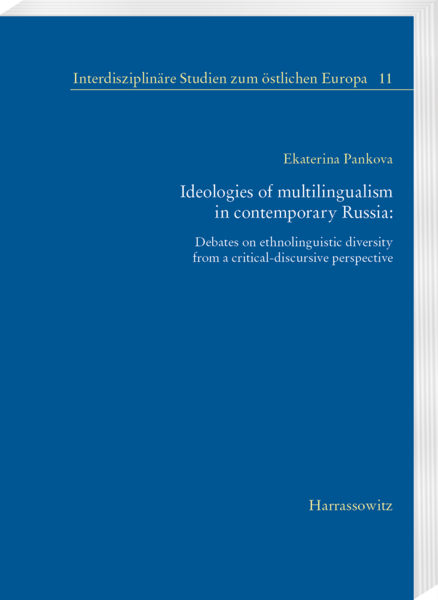Ideologies of multilingualism in contemporary Russia: Debates on ethnolinguistic diversity from a critical-discursive perspective
 The book examines multilayered discursive processes of (un)making the key macro-level policies toward ethnolinguistic diversity in contemporary Russia, where the last two decades witnessed a gradual shift away from the active sponsorship of multilingualism on behalf of the state. To explore this policy shift and its underlying ideologies, the study draws on critical and discursive approaches to language policy. Ekaterina Pankova takes the Republic of Tatarstan and the role of its two official languages, Russian and Tatar, in education as a case in point to investigate how top-down policies are created, interpreted, and contested in three different contexts: the “official” policy discourse of the federal center, parliamentary debates, and online reader commentary on the compulsory study of Tatar. Focusing on discursive strategies employed by various policy stakeholders, the author examines how they construct Russian and Tatar as policy objects and structure the relationship between speakers of the dominant language and members of ethnolinguistic minorities. Her analysis reveals multiple differences in the representation of sociolinguistic realities by federal and regional policy actors, tracing how these discursive tensions are grounded in divergent beliefs about the value, use, and fair distribution of linguistic resources in a multilingual society.
The book examines multilayered discursive processes of (un)making the key macro-level policies toward ethnolinguistic diversity in contemporary Russia, where the last two decades witnessed a gradual shift away from the active sponsorship of multilingualism on behalf of the state. To explore this policy shift and its underlying ideologies, the study draws on critical and discursive approaches to language policy. Ekaterina Pankova takes the Republic of Tatarstan and the role of its two official languages, Russian and Tatar, in education as a case in point to investigate how top-down policies are created, interpreted, and contested in three different contexts: the “official” policy discourse of the federal center, parliamentary debates, and online reader commentary on the compulsory study of Tatar. Focusing on discursive strategies employed by various policy stakeholders, the author examines how they construct Russian and Tatar as policy objects and structure the relationship between speakers of the dominant language and members of ethnolinguistic minorities. Her analysis reveals multiple differences in the representation of sociolinguistic realities by federal and regional policy actors, tracing how these discursive tensions are grounded in divergent beliefs about the value, use, and fair distribution of linguistic resources in a multilingual society.
zum Buch im ULB-Katalog
zum Buch auf der Verlags-Website
Ost-Geschichten: Das östliche Mitteleuropa als Ort und Gegenstand interkultureller literarischer Lernprozesse
 Die öffentliche Aufmerksamkeit, die den literarischen Kulturen des östlichen Mitteleuropa mittlerweile zukommt und die sich auch in den Literatur- und Kulturwissenschaften spiegelt, hat noch kaum in den literaturdidaktischen Diskurs Eingang gefunden. Demgegenüber bildet an unseren Schulen eine aus den Staaten der östlichen Hälfte Mitteleuropas zugewanderte Schülerschaft die größte Gruppe innerhalb einer nach wie vor wachsenden Zahl von Schüler_innen mit Migrationshintergrund. Im Rahmen der interkulturellen Literaturdidaktik präsentiert der Band vielfältige Zugänge und Anknüpfungspunkte für die Vermittlung und Behandlung literarischer Texte aus und über Ostmitteleuropa in Schule und Unterricht.
Die öffentliche Aufmerksamkeit, die den literarischen Kulturen des östlichen Mitteleuropa mittlerweile zukommt und die sich auch in den Literatur- und Kulturwissenschaften spiegelt, hat noch kaum in den literaturdidaktischen Diskurs Eingang gefunden. Demgegenüber bildet an unseren Schulen eine aus den Staaten der östlichen Hälfte Mitteleuropas zugewanderte Schülerschaft die größte Gruppe innerhalb einer nach wie vor wachsenden Zahl von Schüler_innen mit Migrationshintergrund. Im Rahmen der interkulturellen Literaturdidaktik präsentiert der Band vielfältige Zugänge und Anknüpfungspunkte für die Vermittlung und Behandlung literarischer Texte aus und über Ostmitteleuropa in Schule und Unterricht.
zum Buch im ULB-Katalog
zum Buch auf der Verlags-Website
Weitere Titel können Sie in unseren Neuerwerbungslisten für die Slavistik entdecken!
